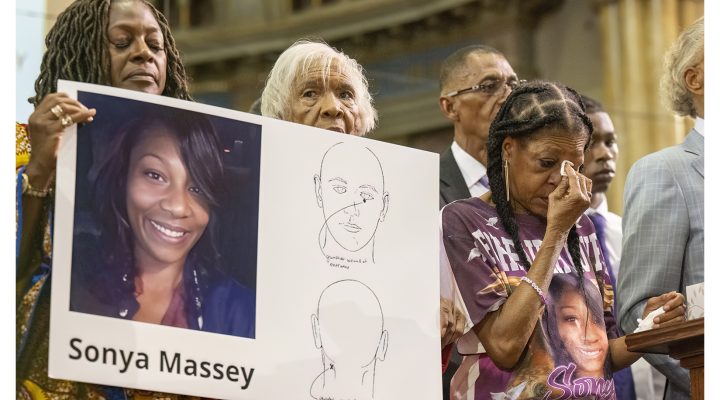Sonya Massey and U.S. Vice President Kamala Harris are fresh examples of the varieties of discrimination and violence Black women face in U.S. society, author Diana Butler Bass said during a recent edition of the “The Convocation Unscripted” webinar.
Massey was the 36-year-old Black woman shot by police July 6 in Springfield, Ill., after calling 911 to report a prowler. She was shot three times inside her home by an officer whose bodycam video recorded her saying, “Don’t hurt me” as he and another officer entered her house.

U.S. Vice President Kamala Harris conducts a roundtable of female entrepreneurs to discuss economic empowerment, inclusion, and leadership in Accra, Ghana, Wednesday March 29, 2023. (AP Photo/Misper Apawu)
Harris, meanwhile, has endured a barrage of sexist and racist attacks since becoming the presumptive Democratic presidential nominee July 21. In social media, speeches and interviews, Republicans have used labels for her like “ho,” “Jezebel” and described her as a “DEI hire.” Donald Trump called her “crazy” and “dumb as a rock” while his running mate, JD Vance, dismissed her as a “childless cat lady.”
The bullets aimed at Massey and the abusive rhetoric hurled at Harris are part of a larger pattern of racial and sexual brutality endured by Black women in America, said Bass, a former college and seminary professor turned historian, speaker and author of the bestseller Freeing Jesus: Rediscovering Jesus as Friend, Teacher, Savior, Lord, Way, and Presence.
She joined fellow religion and politics experts Robert P. Jones and Jemar Tisby for the discussion connected to “The Convocation” Substack they share weekly with scholar Kristen Kobes Du Mez, who did not participate in this webinar.
“I was just so shocked,” Bass said about the barrage of “semi-pornographic, violent images of Black women” she received after sharing news of Harris’ presumptive candidacy on social media. “Kamala bears this double burden of this horrible history of white people sexualizing Black women in very particular ways tied with violence. And then she’s also half Asian American, and there’s another deep racial sexualization that goes on there.”
On one hand, emphasis can be placed on “the extraordinary enthusiasm” Harris is inspiring as the first Black woman to win the Democratic nomination, Bass said. “Then there is this story of Sonya Massey, which is such a terrifying story about being shot in her own home. But really, they (Massey and Harris) are part of the same continuum against people of color.”
The injustice of Massey’s killing cannot be understated and belongs in the same discussion with George Floyd, Mike Brown, Breonna Taylor and other Black people murdered by police, said Tisby, a history professor at Simmons College of Kentucky and author of The Color of Compromise: The Truth About the American Church’s Complicity in Racism.
“Unfortunately, another human being has become a hashtag.”
“Unfortunately, another human being has become a hashtag,” he said. “This is violence against everyday people, but particularly it’s violence against Black women and we need to acknowledge that. We use the hashtag #SayHerName when Black women have been brutalized by law enforcement, and Sonia Massey, we #SayYourName.”
Most Americans share the view that law enforcement killings of Black Americans are part of a systemic pattern, said Jones, president of Public Religion Research Institute and author of The Hidden Roots of White Supremacy and the Path to a Shared American Future.
But PRRI research also consistently reveals most white Christians do not see those patterns, Jones added. “It’s only 26% of white evangelicals who believe it’s part of the pattern. It’s only 40% of white Mainline Protestants, and it’s only 37% of white Catholics. By far, the vast majority of white Christians in this country don’t see the pattern. They believe these are just isolated incidents that really don’t reflect anything about our past, about our culture, about our religion or about injustice in society.”
But the difference this time is that police killing a Black woman comes as another Black woman is set to make history running for the presidency, Tisby noted.
“Now, there seems to be a sense of excitement and enthusiasm, and you can tell by not just the numbers and fundraising, but the way that different groups, particularly historically marginalized groups, are rallying around this person,” Tisby said of Harris.
Since President Joe Biden’s decision not to continue his bid for reelection, Harris has gained an array of endorsements from Democratic governors, mayors, members of Congress and other luminaries and raised $200 million in contributions in a single week.
It’s time for white women to rally around Harris, Bass said. “It’s the job of women who look like me to get out there and be the best allies we can possibly be, and to recognize the fact that Black women have carried a lot for us for a very long time, even when a lot of white women like myself just didn’t deserve it or didn’t recognize it.”
Jones concluded the webinar with a warning to progressives about being too optimistic about early poll results in the presidential race.
“Each of these sides has a margin error of about 3½ points in those state polls. So, you have to be somewhere around 7 points to see something that’s significant. But mostly just ignore them until after Labor Day,” he said. “That’s when people will really start paying attention. We will really start seeing what the shape of the race will be.”


